
Novos Cadernos NAEA
Scope & Guideline
Empowering interdisciplinary dialogue for a sustainable future.
Introduction
Aims and Scopes
- Socio-environmental Studies:
The journal explores the interplay between social dynamics and environmental challenges in the Amazon region, highlighting issues such as deforestation, climate change, and indigenous rights. - Agroecology and Sustainable Development:
Research emphasizes agroecological practices and sustainable development strategies, focusing on family farming, food security, and traditional knowledge in the Amazon. - Cultural and Political Ecology:
The journal investigates the cultural dimensions of environmental issues, including the political implications of resource management and community resistance against environmental degradation. - Public Health and Environmental Policy:
Papers often discuss the implications of environmental policies on public health, particularly in the context of waste management and health services in rural and urban settings. - Biodiversity and Conservation:
Research highlights the importance of biodiversity in the Amazon, promoting conservation efforts through studies on ecological practices and the role of traditional knowledge.
Trending and Emerging
- Climate Change and Resilience:
There is an increasing focus on climate change, particularly how it affects local communities and ecosystems, emphasizing resilience strategies and adaptive practices. - Indigenous Rights and Knowledge Systems:
Research highlighting indigenous perspectives and knowledge systems is gaining traction, reflecting a broader recognition of the importance of indigenous rights in environmental governance. - Waste Management and Public Health:
Emerging studies are increasingly addressing waste management issues in urban and rural contexts, linking them to public health outcomes and sustainable practices. - Food Security and Nutrition:
The journal is placing greater emphasis on food security and nutrition, particularly in relation to agroecology, traditional food systems, and community resilience. - Social Movements and Environmental Justice:
There is a growing trend of research focused on social movements advocating for environmental justice, exploring how these groups influence policy and community engagement.
Declining or Waning
- Traditional Industrial Practices:
There has been a noticeable decrease in research centered around conventional industrial practices in the Amazon, as the focus shifts towards more sustainable and ecologically sound alternatives. - Urbanization without Environmental Considerations:
Studies that solely address urbanization processes without integrating environmental impacts are becoming less common, reflecting a broader trend towards sustainable urban development. - Historical Economic Analyses of the Amazon:
While historical analyses remain relevant, there is a declining emphasis on purely economic historical studies, as contemporary socio-environmental issues take precedence in research agendas. - Large-scale Agricultural Development:
Research on large-scale agricultural development, particularly monocultures, is becoming less frequent, with a shift towards agroecology and smallholder farming systems.
Similar Journals

Forest and Society
Driving discussions on conservation and community.Forest and Society is a premier peer-reviewed journal that serves as a significant platform for researchers, practitioners, and policy-makers in the fields of forestry, geography, and social sciences. Published by the Faculty of Forestry at Universitas Hasanuddin in Makassar, Indonesia, this Open Access journal has been committed to disseminating high-quality research since its inception in 2017. With an impressive impact profile, as evidenced by its Q1 quartile ranking in Forestry and Political Science for 2023, Forest and Society effectively connects innovative research with pressing global issues related to forest management and sustainable development. The journal's objectives include fostering interdisciplinary collaboration and driving insightful discussions around conservation practices and socio-political dimensions of forest governance. By providing unhindered access to invaluable resources, Forest and Society aims to empower the academic community and enhance the sustainable stewardship of forest resources.
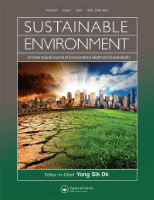
Sustainable Environment
Fostering interdisciplinary dialogue for a sustainable future.Sustainable Environment, published by Taylor & Francis Ltd, is a pioneering journal dedicated to advancing the field of sustainability studies. Since its inception in 2021, this open-access journal has sought to provide a platform for multidisciplinary research that addresses pressing environmental challenges and sustainable practices. With a commitment to disseminating high-quality research swiftly, Sustainable Environment aims to engage researchers, policymakers, and practitioners across various domains, fostering scholarly dialogue and innovation. The journal covers a broad range of topics, including climate change, resource management, and sustainable development, making it a vital resource for anyone looking to contribute to and understand contemporary environmental issues. With its flexible access options, readers from all backgrounds can benefit from the latest insights and findings in sustainability research, thereby promoting a more sustainable future.
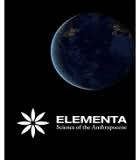
Elementa-Science of the Anthropocene
Transforming knowledge into action for a thriving planet.Elementa: Science of the Anthropocene is an esteemed Open Access journal published by University of California Press, dedicated to advancing interdisciplinary research that addresses the complexities of the Anthropocene epoch. Since its inception in 2013, it has established itself as a leading platform for the dissemination of innovative ideas across several disciplines, including atmospheric science, ecology, environmental engineering, geology, geotechnical engineering, and oceanography, achieving Q1 status in each of these fields as of 2023. With an impact factor reflecting its significant contribution to the scholarly community, Elementa ranks favorably in various Scopus categories, being placed in the 88th percentile in Earth and Planetary Sciences for both Geology and Oceanography. The journal's open-access model ensures that valuable research findings are accessible to a broader audience, fostering collaboration among researchers, professionals, and students dedicated to tackling pressing environmental challenges. Located in Oakland, California, Elementa continues to uphold a mission that underscores the importance of sustainable solutions and comprehensive understanding of the Anthropocene.
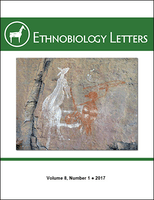
Ethnobiology Letters
Unveiling the Secrets of Biodiversity Through Cultural LensesEthnobiology Letters is a pioneering journal in the field of ethnobiology, dedicated to the scientific study and documentation of the intricate relationships between human cultures and biological diversity. Published by the Société d'Éthnobiologie, this open-access journal has been providing an invaluable platform for researchers and scholars since its inception in 2010. Operating under the ISSN 2159-8126, it aims to promote accessibility and dissemination of knowledge across global communities by making its content freely available. Its contributions have garnered recognition in the realms of anthropology and agricultural sciences, achieving notable ranks in Scopus with a percentile standing in the 56th for Social Sciences and 41st for Agricultural and Biological Sciences. By fostering interdisciplinary dialogue and sharing innovative research, Ethnobiology Letters serves as a crucial resource for academics, practitioners, and students engaged in the exploration of the cultural dimensions of biodiversity.
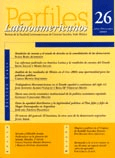
Perfiles Latinoamericanos
Navigating Political and Social Landscapes of the RegionPerfiles Latinoamericanos is a prominent academic journal published by FLACSO-MEXICO, dedicated to advancing scholarly discourse in the fields of Sociology and Political Science. Since its inception in 1992, this Open Access journal has made significant contributions to the understanding of Latin American societal and political dynamics, providing researchers, professionals, and students with valuable insights and analysis. With an ISSN of 0188-7653 and an E-ISSN of 2309-4982, the journal has established itself as a reliable source of knowledge, boasting a respectable Scopus rank within the 36th percentile among its peers. As of 2023, it holds a Q3 ranking in Sociology and Political Science, reflecting its commitment to maintaining rigorous academic standards and fostering impactful scholarship. Researchers can easily access its published articles, contributing to a wider dialogue on critical issues affecting the region. The journal’s coverage span from 2008 to 2024 affirms its ongoing relevance in the academic community.
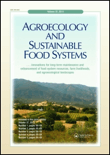
Agroecology and Sustainable Food Systems
Transforming agriculture with cutting-edge research.Agroecology and Sustainable Food Systems, published by Taylor & Francis Inc, is a premier academic journal dedicated to advancing the science of agroecology and its applications in sustainable food systems. With an impact factor that reflects its significant influence in the field, this journal serves as a vital resource for researchers, industry professionals, and students engaged in sustainability, agriculture, and environmental studies. As of 2023, it proudly holds a Q1 ranking in Agronomy and Crop Science, as well as Q2 rankings in Development and Renewable Energy, Sustainability, and the Environment categories. Covering a broad spectrum of topics, it not only shares peer-reviewed research but also encourages discourse on innovative practices and policies that enhance food security and ecological balance. Available for access through various options including Open Access, the journal's commitment to knowledge dissemination is further underscored by its substantial rankings on Scopus, with notable percentiles across multiple disciplines. By focusing on agroecological principles and their socio-economic implications, Agroecology and Sustainable Food Systems is essential for those looking to stimulate meaningful change in agricultural practices and sustainability initiatives worldwide.
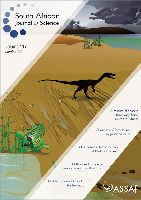
SOUTH AFRICAN JOURNAL OF SCIENCE
Bridging Disciplines, Empowering KnowledgeThe SOUTH AFRICAN JOURNAL OF SCIENCE, published by the Academy of Science of South Africa (ASSAf), is a prestigious open-access journal dedicated to the advancement and dissemination of scientific knowledge across various disciplines. Since its inception in 1973, the journal has played a pivotal role in fostering scientific communication within South Africa and beyond, ranking in the Q2 and Q3 quartiles across critical categories such as Agricultural and Biological Sciences, Biochemistry, Genetics and Molecular Biology, and Earth and Planetary Sciences as of 2023. With an ISSN of 0038-2353 and E-ISSN 1996-7489, this journal embraces modern publishing practices, having adopted an open-access model in 2009, which ensures that research is readily accessible to a global audience. The journal aims to promote interdisciplinary research and facilitate collaboration among scientists, making it an essential resource for researchers, professionals, and students eager to contribute to and learn from the dynamic landscape of scientific inquiry. For further information, collaborators and correspondents may reach out to the journal through its contact address: PO BOX 72135, LYNWOOD RIDGE 0040, SOUTH AFRICA.

Nature + Culture
Bridging Worlds: Uniting Nature and CultureNature + Culture, published by BERGHAHN JOURNALS, focuses on the interdisciplinary exploration of cultural and environmental relationships, bridging the gap between the social sciences and ecological studies. With its ISSN 1558-6073 and E-ISSN 1558-5468, this journal has established itself as a key platform for scholars aiming to advance discussions in an era of rapid environmental change and cultural transformation. Operating from the United States, specifically at 20 Jay St, Suite 512, Brooklyn, NY 11201, it holds a respectable position within the academic community, evidenced by its Q3 ranking in Social Sciences (miscellaneous) for 2023 and its Scopus rank of #132 out of 275 in General Social Sciences. While currently not an Open Access journal, Nature + Culture provides vital insights that address the pressing issues of our time, making it an essential resource for researchers, professionals, and students committed to understanding the intersection of nature and human culture from 2008 through its converging years into 2024.

Regional Environmental Change
Advancing Knowledge on Regional Ecosystem ChangesRegional Environmental Change, published by SPRINGER HEIDELBERG, is a leading journal dedicated to the critical field of Environmental Science, specifically focusing on the global and planetary changes affecting our regional environments. Since its inception in 2005 and continuing through 2024, the journal has been a pivotal platform for disseminating cutting-edge research, insights, and methodologies that address pressing environmental issues. With an impressive Scopus rank, placing it in the top 30% of journals in its category, Regional Environmental Change (ISSN: 1436-3798; E-ISSN: 1436-378X) showcases high-quality academic articles that engage with the multifaceted impacts of environmental shifts, providing researchers, professionals, and students with vital knowledge and data. Although the journal does not currently offer Open Access, it remains a crucial resource for those committed to understanding and mitigating the effects of environmental change on regional ecosystems and communities.

NATURAL RESOURCES JOURNAL
Empowering research that drives natural resource policy forward.Welcome to the NATURAL RESOURCES JOURNAL, a scholarly publication dedicated to the intersection of law and environmental sciences. Published by the University of New Mexico School of Law, this journal has been a crucial platform since 1977 for scholarly discussions and research that shape our understanding of natural resources management and policy. With an impressive impact factor in the realm of law, ranking in the top 60th percentile, and recognized in the Environmental Science category, it serves as an essential resource for researchers, professionals, and students alike. Although not an open-access journal, it provides in-depth analyses and original research that are pivotal in addressing pressing environmental issues. Our objective is to foster interdisciplinary dialogue and enhance legal frameworks related to natural resource management, ensuring a sustainable future through informed policy-making. Join our community of scholars in exploring the multifaceted challenges and innovations in the field.